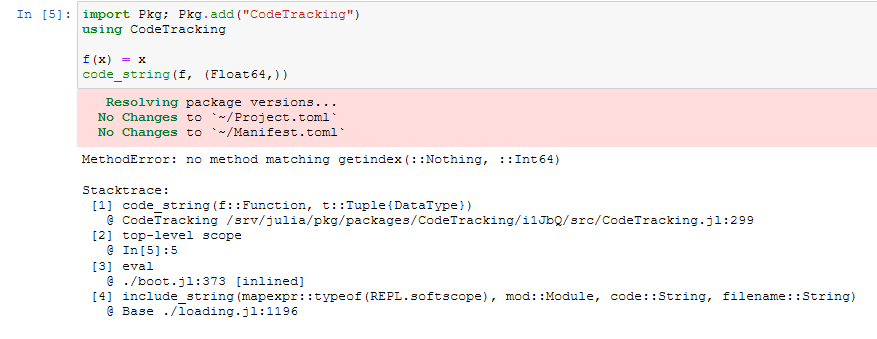CodeTracking can be thought of as an extension of Julia's InteractiveUtils library. It provides an interface for obtaining:
- the strings and expressions of method definitions
- the method signatures at a specific file & line number
- location information for "dynamic" code that might have moved since it was first loaded
- a list of files that comprise a particular package.
CodeTracking is a minimal package designed to work with Revise.jl (for versions v1.1.0 and higher). CodeTracking is a very lightweight dependency.
julia> using CodeTracking, Revise
julia> print(@code_string sum(1:5))
function sum(r::AbstractRange{<:Real})
l = length(r)
# note that a little care is required to avoid overflow in l*(l-1)/2
return l * first(r) + (iseven(l) ? (step(r) * (l-1)) * (l>>1)
: (step(r) * l) * ((l-1)>>1))
end
julia> @code_expr sum(1:5)
[ Info: tracking Base
quote
#= toplevel:977 =#
function sum(r::AbstractRange{<:Real})
#= /home/tim/src/julia-1/base/range.jl:978 =#
l = length(r)
#= /home/tim/src/julia-1/base/range.jl:980 =#
return l * first(r) + if iseven(l)
(step(r) * (l - 1)) * l >> 1
else
(step(r) * l) * (l - 1) >> 1
end
end
end@code_string succeeds in that case even if you are not using Revise, but @code_expr always requires Revise.
(If you must live without Revise, you can use Meta.parse(@code_string(...)) as a fallback.)
"Difficult" methods are handled more accurately with @code_expr and Revise.
Here's one that's defined via an @eval statement inside a loop:
julia> @code_expr Float16(1) + Float16(2)
:(a::Float16 + b::Float16 = begin
#= /home/tim/src/julia-1/base/float.jl:398 =#
Float16(Float32(a) + Float32(b))
end)whereas @code_string cannot return a useful result:
julia> @code_string Float16(1) + Float16(2)
"# This file is a part of Julia. License is MIT: https://julialang.org/license\n\nconst IEEEFloat = Union{Float16, Float32, Float64}"
Consequently it's recommended to use @code_expr in preference to @code_string wherever possible.
@code_expr and @code_string have companion functional variants, code_expr and code_string, which accept the function and a Tuple{T1, T2, ...} of types.
@code_expr and @code_string are based on the lower-level function definition;
you can read about it with ?definition.
julia> using CodeTracking, Revise
julia> m = @which sum([1,2,3])
sum(a::AbstractArray) in Base at reducedim.jl:648
julia> Revise.track(Base) # also edit reducedim.jl
julia> file, line = whereis(m)
("/home/tim/src/julia-1/usr/share/julia/base/reducedim.jl", 642)
julia> m.line
648In this (ficticious) example, sum moved because I deleted a few lines higher in the file;
these didn't affect the functionality of sum (so we didn't need to redefine and recompile it),
but it does change the starting line number of the file at which this method appears.
whereis reports the current line number, and m.line the old line number. (For technical reasons, it is important that m.line remain at the value it had when the code was lowered.)
Other methods of whereis allow you to obtain the current position corresponding to a single
statement inside a method; see ?whereis for details.
CodeTracking can also be used to find out what files define a particular package:
julia> using CodeTracking, Revise, ColorTypes
julia> pkgfiles(ColorTypes)
PkgFiles(ColorTypes [3da002f7-5984-5a60-b8a6-cbb66c0b333f]):
basedir: /home/tim/.julia/packages/ColorTypes/BsAWO
files: ["src/ColorTypes.jl", "src/types.jl", "src/traits.jl", "src/conversions.jl", "src/show.jl", "src/operations.jl"]You can also find the method-signatures at a particular location:
julia> signatures_at(ColorTypes, "src/traits.jl", 14)
1-element Array{Any,1}:
Tuple{typeof(red),AbstractRGB}
julia> signatures_at("/home/tim/.julia/packages/ColorTypes/BsAWO/src/traits.jl", 14)
1-element Array{Any,1}:
Tuple{typeof(red),AbstractRGB}CodeTracking also helps correcting for Julia issue #26314:
julia> @which uuid1()
uuid1() in UUIDs at C:\cygwin\home\Administrator\buildbot\worker\package_win64\build\usr\share\julia\stdlib\v1.1\UUIDs\src\UUIDs.jl:50
julia> CodeTracking.whereis(@which uuid1())
("C:\\Users\\SomeOne\\AppData\\Local\\Julia-1.1.0\\share\\julia\\stdlib\\v1.1\\UUIDs\\src\\UUIDs.jl", 50)CodeTracking has limited functionality unless the user is also running Revise,
because Revise populates CodeTracking's internal variables.
(Using whereis as an example, CodeTracking will just return the
file/line info in the method itself if Revise isn't running.)
CodeTracking is perhaps best thought of as the "query" part of Revise.jl, providing a lightweight and stable API for gaining access to information it maintains internally.
- parsing sometimes starts on the wrong line. Line numbers are determined by counting
'\n'in the source file, without parsing the contents. Consequently quoted- or in-code'\n'can mess up CodeTracking's notion of line numbering - default constructor methods for
structs are not found

